Senate Majority Leader Chuck Schumer reaffirmed his commitment to full federal legalization at New York City's annual Cannabis Parade and Rally.
"We have taken the legalization to the laboratories of democracy, we've done the experiments, and the results are in. What we have accomplished in New York is just the beginning. I will fight with you until fair, just, and full legalization," he said during a speech at the rally.
The senator from New York has been teasing for months the release of a federal cannabis reform bill together with colleagues Sen. Ron Wyden (D-Ore.) and Sen. Cory Booker (D-N.J.). He told Cheddar on Saturday that the release of the bill was imminent.
"Booker, Wyden, and I are putting together the final touches. You'll see it very soon," he said.
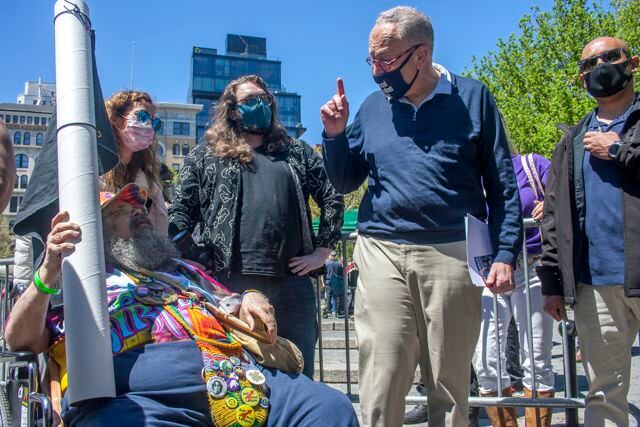
The details of the bill are not yet clear, but a video the senators tweeted out in March, suggested the bill will likely contain provisions designed to ease onerous tax burdens on cannabis companies, as well as prevent monopolies by major companies and industries. The senators also said it would also prioritize social equity through cannabis decriminalization, expungement of prior convictions, and reinvestment into communities harmed by punitive drug laws. And Schumer's more recent comments at the parade and in an April interview with Politico suggest the bill will seek full, federal legalization.
"I am personally for legalization. And the bill that we'll be introducing is headed in that direction," he told Politico.
The Majority Leader has maintained that he has the authority to bring the bill to the Senate floor, where he said on Saturday that he and his colleagues "want to do everything we can to make it pass." Even if it does pass the Senate, President Joe Biden might not be supportive. During a press briefing on April 20, Press Secretary Jen Psaki noted that full legalization conflicts with the president's comparatively more conservative stance on cannabis.
That hasn't dampened Schumer's enthusiasm for legalization — particularly a social justice-focused approach to legalization, like lawmakers adopted in New York. He praised New York's Marijuana Regulation and Taxation (MRTA) Bill as "the most ambitious in the country."
"In the critical areas of racial and economic justice, it sets new standards and makes a real, tangible impact on the lives of millions," he said.
"Today we're working to bring the focus of racial and economic justice you brought to the MRTA to the federal level," he later added.
There couldn't have been a more appropriate time or place for his comments than the first New York City Cannabis Parade and Rally since New York legalized cannabis.
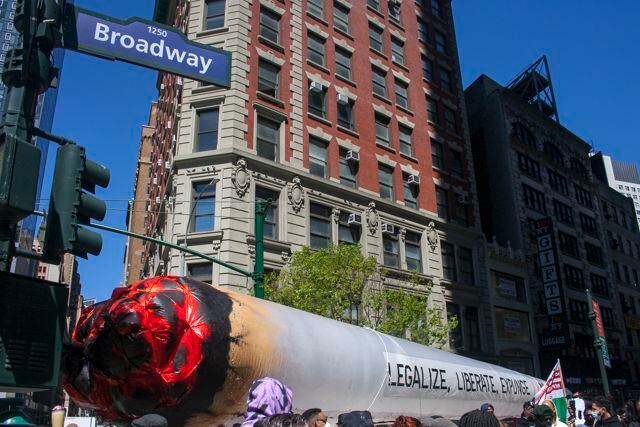
There was a celebratory vibe among parade attendees, who congregated at 30th and Broadway in Midtown Saturday morning. Many were decked out in colorful attire; several shouldered a giant, inflatable joint.
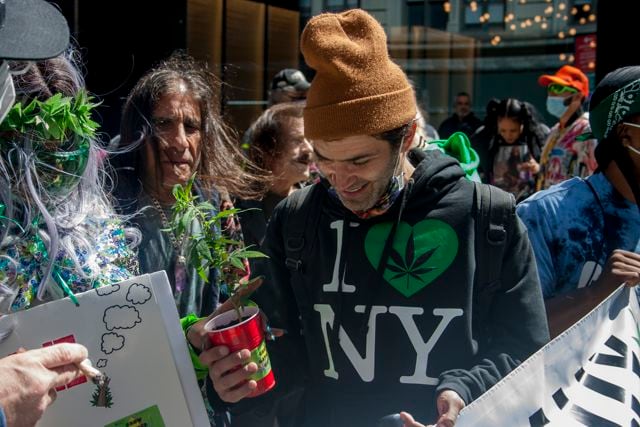
Police looked on placidly as marchers smoked, danced, and even carried small cannabis plants along a blocked off route down to Union Square, where the rally was held.
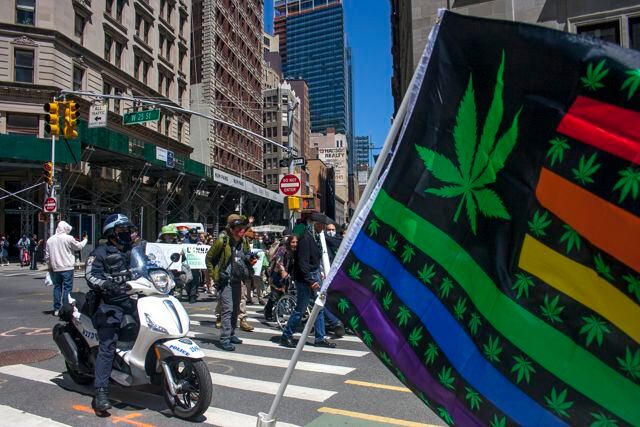
"The purpose is the celebration of cannabis legalization in New York. All the years we worked towards legalization, and we have accomplished the goal. So, now we're here to celebrate, but also talk about the future of cannabis policy in New York," said Steve Bloom, publisher of CelebStoner and one of the parade's organizers.
Aside from the Senate Majority Leader, this year's featured speakers included activists, influencers, entrepreneurs, and elected officials like Attorney General Letitia James
"We cannot assume that changing the law to legalize cannabis will be enough to deliver the justice and opportunity that we hope it will bring. It's a good start. But we need more," she said. "We've got to provide opportunities for everyone and particularly people who have been locked out of the sunshine of opportunity for too long."
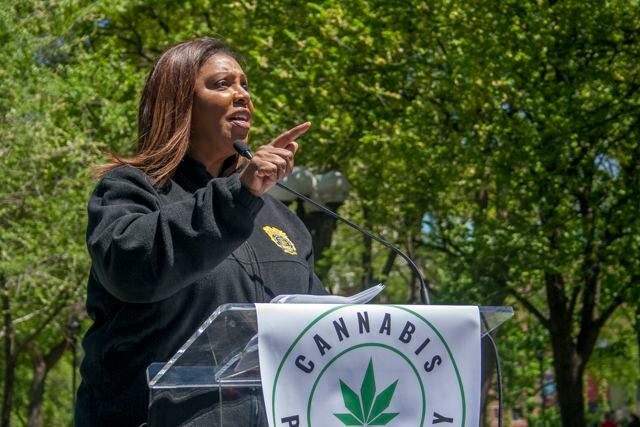
Steve DeAngelo, the longtime activist and founder of California's iconic Harborside dispensary and cannabis criminal justice reform nonprofit Last Prisoner Project, flew in from California for the parade.
"The first time I marched in this march, I was 17 years old back in 1975. And marching down the street today, being able to, for the first time, smoke a joint legally in the streets of New York City. It's really an emotional moment for me," he said. "I've had some tears coming down my face. It's been a long, long road."
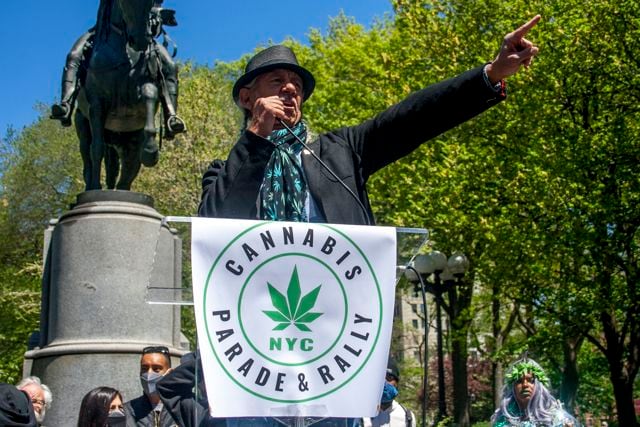
The event, which traces its origins back to a 1973 "Smoke-In," must have looked very different then. Organizers say attendance peaked at about 20,000 in the late '70s. In 2021 amid the coronavirus pandemic, they attempted to cap attendance at 200. In spite of diminished numbers, however, the parade has provided a consistent opportunity for activists and their political allies to call for reform throughout the years.
Having accomplished their goal — at least in New York — activists have already begun to rethink their own roles and the function of events like the NYC Cannabis Parade and Rally. They say their jobs are far from over.
According to DeAngelo, the job of the New York cannabis movement going forward is to ensure regulations "faithfully reflect the intention of the legislation" by creating an industry that generates wealth for a broad base of the population, especially those communities disproportionately harmed by punitive drug laws.
"Now, we just have to hold the politicians' feet to the fire. We have to make sure that the heads of the agencies who are charged with these regulations faithfully carry them out. And it's not easy work," DeAngelo said.
According to the American Civil Liberties Union, Black Americans are almost four times as likely to be arrested for cannabis possession than white Americans despite comparable rates of use. In New York City, disparities are even worse. In spite of dramatic drops in the number of overall cannabis arrests due to decriminalization and a shift in NYPD policy, 93 percent of people arrested for cannabis possession in 2020 were Black or Hispanic, according to NYPD data. Drug arrest can have serious consequences on housing, education, and job prospects even when it doesn't result in a conviction.
Bloom echoed DeAngelo's assessment that activists will focus their attention on ensuring regulation efforts create a fair and equitable industry in New York. But looking ahead, there are new frontiers where cannabis activists can focus future drug reform efforts.
"Psychedelics are the new medical marijuana," he said.



